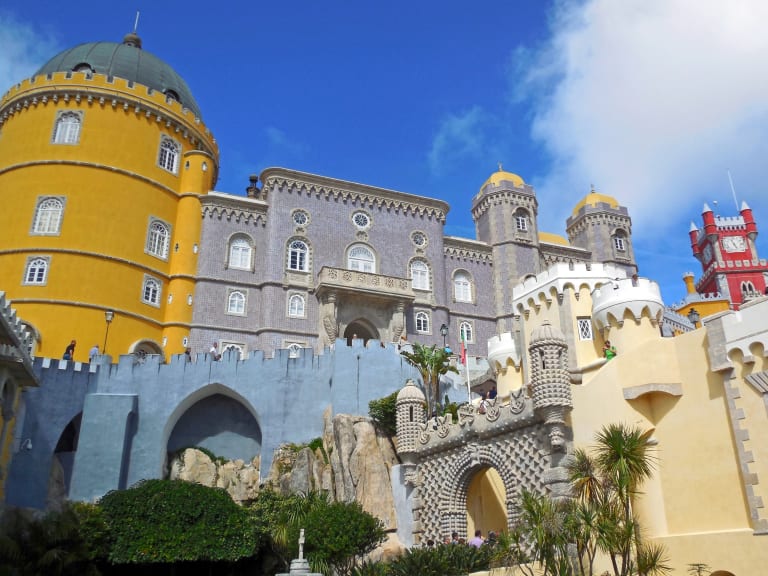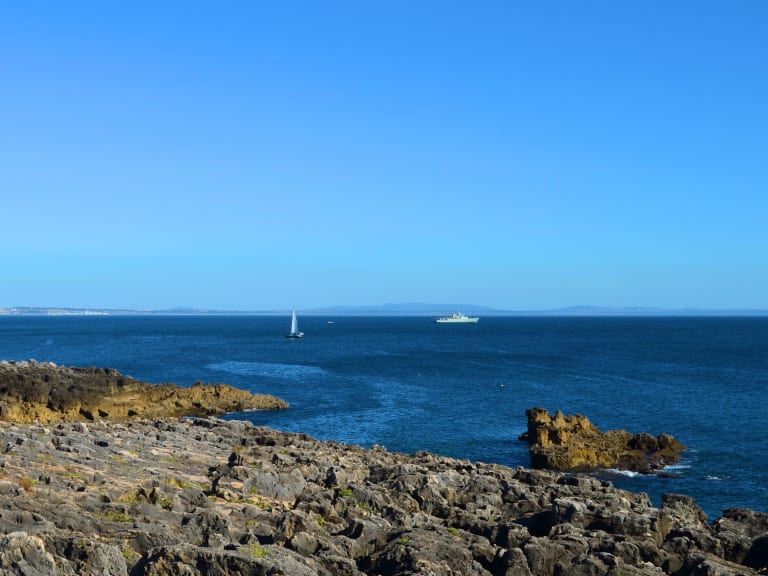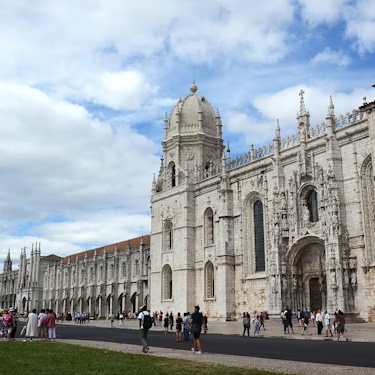More about: Lisbon in 4 Days: everything you need to know
If you are thinking about the number of days you should travel to Lisbon to get to know it in depth and without leaving anything behind, in my opinion, the answer is 4 days. In that time you will be able to visit its most important neighbourhoods and monuments without being crowded and, in addition, you will have time to visit some of the interesting surrounding cities such as Sintra or Cascais.
- Lisbon Alfama and São Jorge Tour with Guided Visit to the Cathedral
- From £17
- 3 hours
- Small group tour
- With entrance to the Lisbon Cathedral and visit to the secret Jewish quarter.
- Professional guide
- Book now
- Lisbon Belem Tour
- From £30
- 3 hours
- Small group tour
- Tour the Jerónimos Monastery, the Monument to the Discoveries and more
- Professional guide
- Book now
- Lisbon Jerónimos Monastery Tickets
- From £16
- At your own pace
- Explore on your own
- With access to the 16th century cloister and the former monks' refectory
- Without guide
- Book now
- Sintra, Cascais, Pena Palace and Cabo da Roca Day Trip from Lisbon
- From £57
- 8 hours
- Small group tour
- Does not include entrance fees to Pena Palace and Quinta da Regaleira monuments.
- Professional guide
- Book now
Day 1: Get to know the historical centre, the Alfama, Baixa and Chiado districts

The best thing to do when you arrive in Lisbon is to start by visiting its most central neighbourhoods: Alfama, Baixa and Chiado make up the historic centre of the Portuguese capital and there is plenty to see and do in their streets. If you get up early in the morning, you can explore them all at your leisure and see what they have to offer on the first day of your trip to Portugal's capital.
Walk around the Alfama neighbourhood
The best starting point to get to know Lisbon is to book a guided tour of Alfama. This historic area is situated on one of the hills of the city under the watchful eye of St. George's Castle and captures the essence of Lisbon's culture. The most interesting places to visit in the Alfama neighbourhood are, besides the castle of St. George:
- Lisbon Cathedral.
- The viewpoints of Portas do Sol.
- Santa Lucia.
- The National Pantheon.
You'll get to know all this in depth on this three-hour tour of Alfama and St. George's with a professional guide who will show you the history and architecture of this neighbourhood.
And if you go to Alfama on your own, bear in mind that you can explore it on foot or by taking the famous tram 28, which passes through most of the neighbourhood and will save you having to climb several of its many steep streets. I recommend that you spend some time just strolling around and enjoying the atmosphere, street musicians and gastronomy.
Descend to Baixa and Chiado neighbourhoods
After visiting Alfama, it's time to head down to the Baixa and Chiado neighbourhoods. To visit them you can book the Lisbon sightseeing tram or if you prefer to walk, go to Pedro IV. square as a starting point and, from there, go down Rua Augusta in the direction of Praça do Comércio.
Before reaching this point, take a detour to go up the Santa Justa elevator. With this lift, in addition to the viewpoint, you can go up to the Convento do Carmo to visit its spectacular ruins. Now, to finish the day, head for the Plaza del Comercio.
At this famous spot you can climb the Rua Augusta Arch and enjoy the banks of the Tagus. Near the square there are many restaurant options where you can end the day with a good dinner.
Enjoy a walk along the Tagus at sunset.
And to end the day, there is no better plan than booking a sailboat ride. Feeling the wind on your face as you sail along the Tagus is a sensation you should not miss.
This trip, which lasts approximately two hours, will allow you to admire Lisbon's most important monuments while you enjoy a glass of Portuguese wine.
Day 2: Discover the Belém neighbourhood in depth

The second day starts right where the first day ended, at Praça do Comércio. From there, you can take tram number 15 to the Belém area. This Lisbon neighbourhood is located 7 kilometres from the centre and takes about 20 minutes by tram. It has so many points of interest to see that you should dedicate the whole day to the Belem neighbourhood tour.
Visit the Jerónimos Monastery
The Jerónimos Monastery, a World Heritage Site, has the distinction of being the most visited monument in Lisbon. It is a spectacular complex made up of an impressive cloister and church and the national archaeological museum housed in its east wing.
I recommend that you book your tickets to the Jerónimos Monastery in advance, as there is always a queue. Nevertheless, the visit is well worth it. The monastery is a must-see in Lisbon.
Taste the Pasteles de Belém
One of the most famous experiences in the Belém neighbourhood is tasting its famous pastries. These sweets have crossed borders and are very popular, but nowhere can you taste them better than in their place of origin. Next to the monastery is the original factory where you can taste these delicacies.
And if you are passionate about these cakes, as I am, don't hesitate and book a pastel de nata cooking class. They will teach you how to make these culinary delights while you enjoy a cup of tea or coffee.
Don't miss the Monument of the Discoveries
Opposite the Jerónimos Monastery and across the Plaza del Imperio Garden is the Monument to the Discoveries.
It is one of the most photographed spots in Lisbon, thanks to its spectacular nature with a height of more than 50 metres. It was built to honour the memory of the discoverers who set sail from the same waters where Lisbon is located.
Enter the Belém Tower
On the west side of Belém and jutting out into the waters of the Tagus is the Torre de Bélem, arguably Lisbon's most iconic landmark. It is a small fort on the banks of the Tagus that was used to defend the city, as a lighthouse and even as a dungeon.
Book tickets for the Belém Tower and visit its interior and terrace, while enjoying the spectacular views of the Tagus River and the 25th April Bridge.
These are the must-see sights of Belém, but if you're still hungry for more, you can visit some of its many museums, such as the archaeological museum or the carriage museum, or stroll through its parks and gardens.
Day 3: Take a trip to Sintra

After two days in Lisbon, you'll have had plenty of time to see the main sights. Now it's time to visit the surroundings and one of the highlights of Portugal is Sintra. Located about 30 kilometres from Lisbon, this town is an almost fairytale setting for its palaces and gardens.
So much so that it was declared a World Heritage Site in 1995. It is located in the middle of a natural park, Sintra-Cascais.
Visiting Sintra from Lisbon can be done by car or bus, but it is best to book an excursion to Sintra, which includes return transport and a professional guide who will show you all the charms of the place. Here are some options:
- Excursion to Sintra and Cascais, from £63.
- Excursion to Sintra, Cascais, Pena Palace, Cabo da Roca and Regaleira, from 57.
- Excursion to Sintra, Cascais and Cabo da Roca, from £76.
Be dazzled by the Pena Palace
There are many buildings to see in Sintra. The Pena Palace is the most visited and emblematic and one of the most popular monuments in Portugal. It is also considered one of the most beautiful palaces in Europe thanks to its unique blend of styles.
The Pena Palace should be the first and obligatory visit on your trip to Sintra. So, don't hesitate to book your ticket to the Pena Palace and let yourself be dazzled by this fairytale castle, as well as its 200 hectares of gardens. And if you have time, you can also book tickets for the Pena Park in Sintra.
Discover Quinta da Regaleira
It stands out for its architecture, its gardens, its mysticism and is closely linked to the Masonic cult. It holds many secrets so it is advisable to visit it with a guide.
It is another must-see in Sintra and you can book an excursion to Quinta da Regaleira together with Sintra, Cascais, Pena Palace and Cabo da Roca, which lasts approximately eight hours.
Don't miss Sintra's National Palace
Located in the centre of Sintra, the National Palace has preserved its interior almost intact. Its two large cone-shaped chimneys, visible from many parts of the park and the village of Sintra, are striking from the outside.
Explore the Monserrate Palace
Known as the hidden gem of Sintra, it is not as popular as its neighbours. However, it has more than enough charm to make it a must-see in Sintra.
Visit the Castelo dos Mouros
These last 4 are considered Sintra's must-sees, but the town is home to many more treasures. If time permits you can book tickets for the Castelo dos Mouros, the Convento dos Capuchos or the Countess' Chalet and Garden.
Day 4: Spend a night in the Alto quarter and go to Cascais

The fourth day in Lisbon has to start during the evening of the third day. After spending several hours in Sintra, what better way to immerse yourself in Lisbon's nightlife than in the best area to do so, the Alto district. On our last day you can take the opportunity to make another excursion to the village of Cascais, very close to Lisbon, and finish your sightseeing by visiting the Park of the Nations.
See the Bairro Alto by night
After visiting Sintra, the best thing to do is to enjoy Lisbon's nightlife and the perfect place to do so is the Bairro Alto. Right in the heart of the city centre, this neighbourhood is avant-garde, modern and full of life, especially when night falls.
There is a wide range of restaurants where you can dine even while enjoying a Portuguese Fado performance. And after dinner you can enjoy its numerous pubs or go to the Santa Catalina viewpoint, where, as well as enjoying the night-time views, it is common to find stages for night-time concerts. It is also a meeting point for Lisbon's inhabitants and there is always a good atmosphere on its terraces.
Stroll around Cascais
On the morning of the fourth day, you have the option of booking an excursion to Cascais, which is located about 30 kilometres from Lisbon and was during the 20th century a town mainly of aristocrats and artists, which is evident as soon as you walk through its streets with beautiful palaces and numerous street performers.
In the 1940s, fleeing from the war, many nobles came here to take refuge in their palaces and enjoy the beaches. This atmosphere is said to have inspired Ian Fleming to give life to the character of James Bond. Spending a morning strolling through its streets and enjoying its beaches is a highly recommended activity , especially if you visit in summer.
Say goodbye at the Park of Nations
After visiting Lisbon in depth, a good way to say goodbye to the city is to do so in the Parque das Nações, which is located in the eastern part of the city in what was once an industrial neighbourhood.
This modern, futuristic park was built to host the 1998 World Expo. It is very different from other neighbourhoods because of its modern buildings such as the Gare Do Oriente station, designed by Santiago Calatrava, or the Lisbon Oceanarium, which is one of the largest aquariums in Europe and a must-see, especially if you are travelling with your family. Of course, book your tickets for the Lisbon Oceanarium in advance because they are in high demand.
To say goodbye to Lisbon you can take the park's cable car to watch the sunset from the heights with the Vasco de Gama Bridge in the background. It is the longest bridge in Europe, spanning 17 kilometres across the Tagus River.




